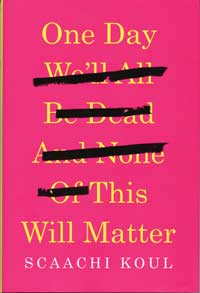
by Scaachi Koul
DOUBLEDAY CANADA
2017/$25.00/256 pp.
Intuition says that personal essay should come easily to authors who’ve grown up in the Internet age. What better incentive to hone your craft than a constantly connected audience hungry for a window onto your life? Scaachi Koul, a Calgary-born-and-raised culture writer for BuzzFeed Canada perhaps best known for her prolific and acerbic Twitter presence, is one of these authors. Her first essay collection, One Day We’ll All Be Dead And None of This Will Matter, will have a familiar cadence for anyone who follows her work online.
Koul is an expert at mining tidy nuggets of hilarity and drama buried in drab situations. In one essay she describes being cut out of a skirt with a broken zipper by an employee in an upscale boutique—“the saddest version of a C-section, where the baby is just a half-naked lady with no dignity.” But personal essay demands a greater degree of vulnerability than is possible with a 140-character limit. Koul also peels away layers of flippancy and hyperbole to reveal tender anxieties and recent wounds—for instance, the campaign of online harassment that led Koul to a breakdown and subsequent Twitter hiatus, and the struggle to repair her relationship with her Kashmiri parents after introducing them to her white boyfriend.
Koul drips contempt for the exoticized, fawning-yet-frightened gaze westerners often inflict upon the rest of the world, rendering India “a place just close enough to Pakistan or Iraq or Afghanistan to be scary, but stable enough to be fun and exotic.” Her refusal to romanticize her diasporic identity is one of the collection’s greatest assets; it makes distant lands familiar and familiar lands weird and fascinating—such as her parents’ peach-coloured home in suburban southwest Calgary, or the crumbling Toronto Best Western, partially converted into university student housing, where Koul and her friends spent their undergraduate years learning how to drink.
Koul’s family looms large in these essays (delightfully punctuated by Koul and her father’s terse daily email exchanges, in which he issues such edicts as “Treat me like a demigod. Not a full-god, an in-between god.”) The family’s influence on Koul is so palpable it can feel claustrophobic. While it’s plain Koul is most at home in Canada—“a country made of ice and casual racism”—she’s unmoored by an insatiable longing for the home her parents left behind, a sensation she summarizes neatly when travelling to India for a family wedding: “You’re not going to relax, you’re not going to have a nice time. No, you’re going so you can touch the very last of your bloodline, to say hello to the new ones and goodbye to the older ones, since who knows when you’ll visit again. You are working.”
—Miranda Martini is an essayist and musician in Calgary.

